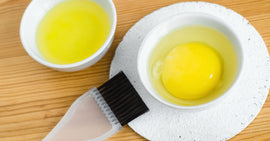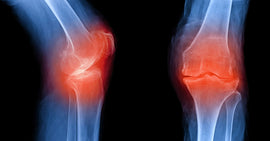One moment, you feel fine and the next, you are flushed and feel like you are trapped in a sauna. It lasts for a while before it goes away. Then you get to feel this over and over again.
If that wasn’t enough, your stomach muscles tighten up, and you feel like you are going to vomit at any second. You start to feel dizzy and sick.
Hot flashes and nausea often go hand in hand. Roughly 60-80% of menopausal women struggle with hot flashes when they transition during menopause. According to a study of 152 women, of all reported hot flashes, 5% happened concurrently with nausea. [1] [2] But, to truly manage these symptoms, you should closely examine the link between them.
How Does It Feel to Have a Hot Flash?
Hot flashes are strong sensations of heat. You feel as if you are boiling from the inside out.
Hot flashes are highly dynamic. Some women sweat a lot so that their bodies can take care of the heat while others do not. The intensity and frequency vary from well-tolerated (mild) to unbearable (severe).
Sometimes, there can be a sudden onset of dizziness, nausea, and sweating, especially if the estrogen levels start to plummet.
How Does a Hot Flash Present Itself?
When hot flashes start to kick in, the core body temperature increases. More blood flows to your chest, extremities, back, and stomach, and you start to feel hot and very uncomfortable.
Your face gets flushed, the hair on your head can be soaking wet, and your chest can turn red. In some cases, the heart rate and metabolic rate can increase. [3]
Even though hot flashes often reduce in intensity and frequency after menopause ends, some women may continue to have them.
So, what are the signs of coming to the end of menopause? The symptoms you felt in perimenopause can persist into postmenopause. But, most women tend to feel better. Their libido increases, and they will have more energy, better focus, and improved organ function.
What Can Trigger a Hot Flash?
Many risk factors can lead to hot flashes. These include:
- Lifestyle
- Age
- Gender
- Genetics
- Medical conditions
- Medications
- Mental health conditions
According to a study, old age, depression, and cigarette smoking can all increase the odds of more frequent and severe hot flashes in women. [4]
Based on another report, it turns out that if women have somatic anxiety, their chances of experiencing hot flashes increase by more than 3 times. Managing the daily stressors is crucial for those prone to anxiety hot flashes. [5]
Nausea - Feeling Sick to Your Stomach
Nausea is a sensation that causes an urge to vomit. It can be short-lived and acute, or prolonged.
Sometimes, the upset stomach makes you feel like you are going to throw up, except that nothing comes out. This unpleasant sensation can cause significant discomfort in the upper stomach, and in some cases (not all), can cause vomiting.
Nausea is not often a sign of menopause but it can happen. That’s why women prefer to use the best menopause supplements. Some vitamins can boost overall health and curb the symptoms.
What Causes Nausea?
Different factors can trigger nausea. They include:
- Gastrointestinal problems (i.e., GERD, intestinal obstruction, appendicitis, etc.)
- Infections (i.e. viruses, food poisoning, stomach flu, etc)
- Pregnancy
- Medications (i.e. antibiotics, opioids, NSAIDs, etc)
- Motion sickness
- Stress
One survey of 497 women evaluated the GERD symptoms in women between 25 and 60 years old. Results showed that 47% of menopausal and 42% of perimenopausal had upper GI symptoms. They felt sick, had heartburn, and serious discomfort. [6]
But, can menopause cause nausea? Any hormonal changes, whether they are caused by natural hormone reduction during menopause, hot flashes, or HRT (hormone replacement therapy) can make you feel nauseous.
How Are Hot Flashes and Nausea Connected?
Hormonal shifts can happen to anyone. They are influenced by a complex interplay between psychological, and physical factors, and brain chemistry. These changes in hormones are usually the main culprit for inducing hot flashes and nausea which tend to happen in women.
The sinking estrogen levels make it difficult for the body to regulate its temperature, which induces hot flashes. When the estrogen suddenly plummets, it can make the woman feel nauseous. [7]
What Factors Can Make Nausea and Hot Flashes Worse?
Many factors can worsen the hot flashes and nausea. They include:
- Mental stressors - Your stress, depression, or anxiety can translate into a bunch of GI symptoms. You can feel stomach pain, nausea, change in bowel movement, and profuse sweating.
- Spicy foods - If the food you are eating irritates the stomach lining and causes the blood vessels to dilate, then your hot flashes can feel worse. Foods packed with capsaicin can trigger a sensation of heat.
- Alcohol - Drinking too much can make the body release more acid and irritate the stomach lining.
- Some treatments - Cancer therapy and medications like opioids can worsen stomach discomfort and hot flashes.
Management Strategies That Can Work for Both
Here are a couple of options that can mitigate hot flashes and nausea:
- Hormone therapy: This is a practical approach for getting the hormones back on track.
- Lifestyle changes: Try to eat healthy, whole foods, and avoid any products that can irritate the stomach.
- De-stressing: Options like mindful meditation, yoga, aromatherapy, and walking can help give your mind a break.
- Taking the right medicine: If any of the drugs you are taking are interfering with your daily life, talk to your doctor.
- Other options: Some people prefer an all-natural solution to curb the symptoms. The Somulin Nighttime Complex can ease stress and help you fall asleep quicker. By regulating your sleep-wake cycles, it can have a positive impact on your GABA levels. The formula is designed to provide a sense of peace, improve your mood, and reduce feelings of anxiety.
Can Diet Help with Hot Flashes?
Food is more than just a source of sustenance. It plays a key role in how you take care of your body for the years to come. What you eat can impact hot flashes by influencing hormones, weight, and overall health.
You should opt for:
- Antioxidant-containing foods (i.e. blueberries, beans, spinach, garlic, etc)
- Whole grains
- Phytoestrogen-rich foods (i.e. cabbage, sprouts, pears, etc)
- Foods packed with vitamin E (i.e. kiwi, broccoli, turnip greens, etc)
- Water
- Mushrooms
- Omega-3 Fats (i.e. herring, tuna, mackerel, sardines, etc)
Different Ways to Treat Hot Flashes
Your doctor can recommend estrogen treatment, progesterone therapy for high progesterone symptoms, non-hormonal treatment, or other alternatives, like synthetic estrogens.
The Menoquil menopause supplement is an OTC supplement that could help with menopause symptoms. The product contains a blend of ingredients with powerful nutritional and herbal components free of hormones.
Menoquil can keep the hormones in check and manage the night sweats.
FAQs
What can cause hot flashes and nausea?
The drastic change in hormones is usually to blame.
Can hot flashes be an effect of something else other than menopause?
Other health problems can lead to night sweats, like thyroid complications, cancer treatments, or side effects from medications.
What are the 4 patterns of hot flashes?
Hot flashes have a unique pattern. Usually, they start with an early onset right before the last menstrual cycle and subside after menopause. Then there is the onset of symptoms close to the final cycle followed by a subsequent decline.
Some women experience symptoms at an early stage. They have consistent and frequent episodes. Others have consistent hot flashes but happen less often.
Wrap Up
Hormonal imbalance can bring about hot flashes and nausea. Once the hormones are stabilized, the symptoms should subside.
References
1] ↑https://www.sciencedirect.com/topics/medicine-and-dentistry/hot-flush
2] ↑https://journals.lww.com/menopausejournal/Abstract/2016/11000/Measuring_hot_flash_phenomenonology_using.11.aspx
3] ↑https://www.webmd.com/menopause/menopause-hot-flashes
4] ↑https://www.ncbi.nlm.nih.gov/pmc/articles/PMC4573383/
5] ↑https://www.ncbi.nlm.nih.gov/pmc/articles/PMC4993654/
6] ↑https://pubmed.ncbi.nlm.nih.gov/18460167/
7] ↑https://www.ncbi.nlm.nih.gov/books/NBK279311/




